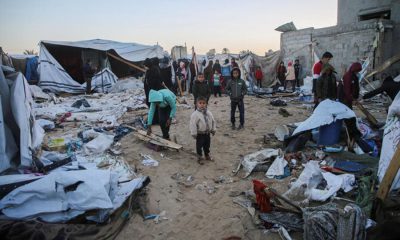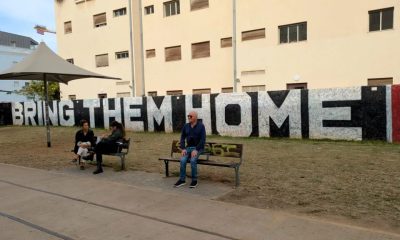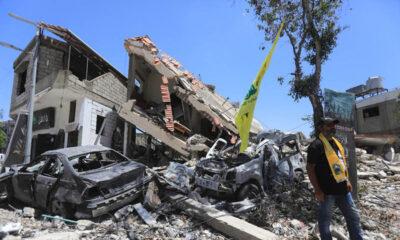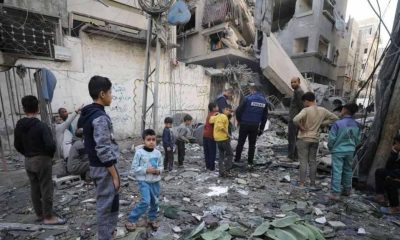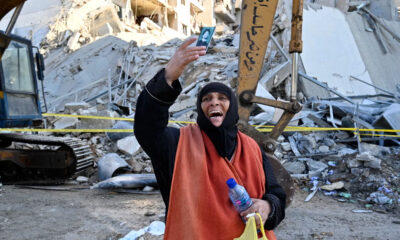International
Gaza: Thousands rally for hostage deal as ceasefire talks continue

Gaza: Thousands rally for hostage deal as ceasefire talks continue
Tens of thousands of Israelis rallied late into the night calling for a deal to bring hostages home, ahead of further ceasefire talks.
Protesters in Tel Aviv chanted “war is not holy, life is”, with some accusing Prime Minister Benjamin Netanyahu of aiming to prolong the conflict.
It came as a Hamas delegation met mediators in Egypt on Saturday.
The group said there were no new developments, but added “a new round will begin” on Sunday.
Negotiators have resumed long-running negotiations in Cairo – brokered by Egypt and Qatar – on pausing Israel’s offensive in Gaza in return for freeing hostages.
The main sticking point appears to be whether the deal would be temporary or permanent.
It is thought the wording being discussed involves a 40-day pause in fighting while hostages are released, and the release of a number of Palestinian prisoners being held in Israeli jails.
An adviser to the Hamas leader, Ismail Haniyeh, said the group was looking at the latest proposal with “full seriousness”.
READ ALSO:
- Ronaldo’s hat-trick leads Al Nassr to a 6-0 Victory over Al Wehda
- Nigeria to reduce electricity supply to Niger Republic, Benin, Togo
- Edo, Delta areas to experience two-week power outage – TCN
But he repeated a demand that any deal would have to explicitly include an Israeli withdrawal from Gaza and complete end to the war.
An anonymous Israeli government official told local media on Saturday that Israel would “under no circumstances agree to end the war as part of an agreement to free our abductees”.
They added: “The IDF will enter Rafah and destroy the remaining Hamas battalions there – whether there is a temporary pause to free our captives or not.”
Mr Netanyahu has faced pressure from within his far-right coalition to press ahead with the long-promised offensive in Gaza’s southern-most city, where an estimated 1.4 million people have taken shelter after fleeing fighting in northern and central parts of the strip.
The US – Israel’s biggest diplomatic and military ally – is reluctant to back a new offensive that could cause significant civilian casualties, and has insisted on seeing a plan to protect displaced Palestinians first.
Saturday’s demonstrations in Israel were the latest display of the increased domestic pressure Mr Netanyahu is facing to secure the return of the hostages.
Of the 252 who were kidnapped by Hamas on 7 October, 128 are still unaccounted for – and among them, at least 34 are presumed dead.
Natalie Eldor, a protester in Tel Aviv, told Reuters news agency she was there to “support a deal now, yesterday”.
“We need to bring all the hostages back, the live ones, the dead ones. We got to bring them back. We got to switch this government,” she added.
READ ALSO:
- Coastal highway project to disrupt DStv, GOtv services
- Former Minister of Education Gbagi dies at 62
- Russia adds Zelensky to ‘wanted’ list of criminals
Some who gathered at the Kirya military base in Tel Aviv accused the prime minister of undermining the proposed truce, while others called for an end to the war.
Addressing the prospects of a truce on Saturday, minister Benny Gantz, a member of Israel’s war cabinet, said: “An official response to the outline has not yet been received. When accepted – the war management cabinet will meet and discuss it.
“Until then, I suggest to the ‘political sources’ and all decision-makers to wait for official updates, to act calmly and not to get into hysteria for political reasons.”
Ceasefire talks have gone on for months without a breakthrough, and there has not been a pause in fighting or a release of hostages since the end of November.
There have been moments at which a new agreement has seemed imminent – only to fall through before being signed.
A source familiar with this latest round of discussions told the BBC that the negotiations were still complex, and any breakthrough could still take several days.
Meanwhile, the head of the United Nations’ World Food Programme has warned that northern Gaza is now experiencing a “full-blown famine”.
Cindy McCain warned the catastrophic situation in the territory was spreading south in an interview with US media.
“What we are asking for and what we’ve continually asked for is a ceasefire and the ability to have unfettered access to get in safe,” Ms McCain said.
The war began after waves of Hamas gunmen stormed across Gaza’s border into Israel on 7 October, killing about 1,200 people and taking more than 250 hostages. The group is proscribed as a terrorist organisation by many Western countries.
During the subsequent Israeli military campaign in Gaza, more than 34,600 Palestinians have been killed and over 77,900 wounded, according to figures from the territory’s Hamas-run health ministry.
Gaza: Thousands rally for hostage deal as ceasefire talks continue
International
Syria not threat to world, rebel leader al-Sharaa tells BBC
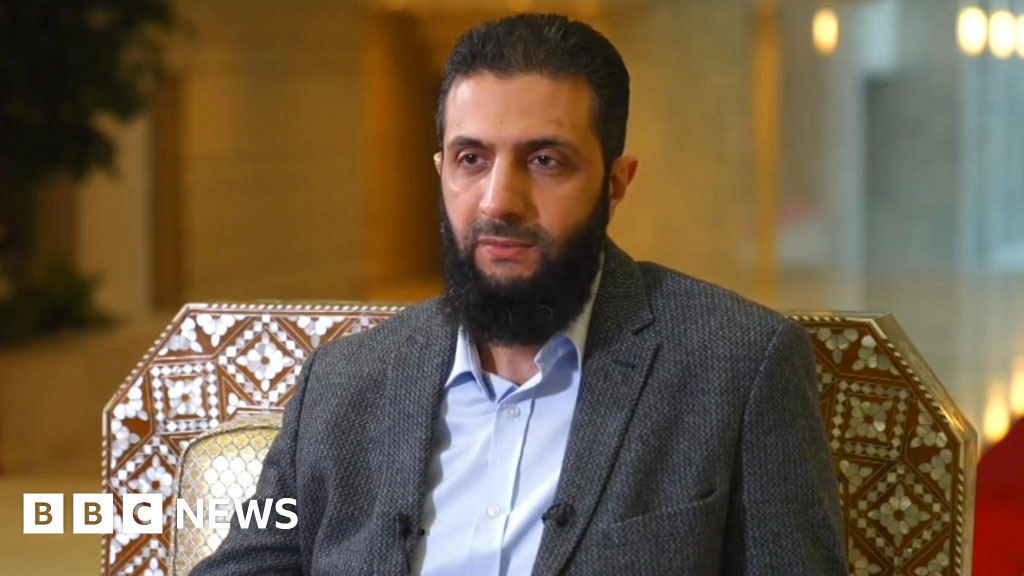
Syria not threat to world, rebel leader al-Sharaa tells BBC
The de facto leader of Syria, Ahmed al-Sharaa, has said the country is exhausted by war and is not a threat to its neighbours or to the West.
In an interview with the BBC in Damascus, he called for sanctions on Syria to be lifted.
“Now, after all that has happened, sanctions must be lifted because they were targeted at the old regime. The victim and the oppressor should not be treated in the same way,” he said.
Sharaa led the lightning offensive that toppled Bashar al-Assad’s regime less than two weeks ago. He is the leader of the Hayat Tahrir al-Sham (HTS), the dominant group in the rebel alliance, and was previously known by his nom de guerre of Abu Mohammed al-Jolani.
He said HTS should be de-listed as a terrorist organisation. It is designated as one by the UN, US, EU and UK, among many others, as it started as a splinter group of al-Qaeda, which it broke away from in 2016.
Sharaa said HTS was not a terrorist group.
They did not target civilians or civilian areas, he said. In fact, they considered themselves to be victim of the crimes of the Assad regime.
He denied that he wanted to turn Syria into a version of Afghanistan.
READ ALSO:
- Tinubu’s 2025 budget will increase poverty, worsen economy – PDP
- Real Madrid outclass Pachuca to win FIFA Intercontinental Cup
- Israel hits ports, energy sites in Yemen after missile intercepted
Sharaa said the countries were very different, with different traditions. Afghanistan was a tribal society. In Syria, he said, there was a different mindset.
He said he believed in education for women.
“We’ve had universities in Idlib for more than eight years,” Sharaa said, referring to Syria’s north-western province that has been held by rebels since 2011.
“I think the percentage of women in universities is more than 60%.”
And when asked whether the consumption of alcohol would be allowed, Sharaa said: “There are many things I just don’t have the right to talk about because they are legal issues.”
He added that there would be a “Syrian committee of legal experts to write a constitution. They will decide. And any ruler or president will have to follow the law”.
Sharaa was relaxed throughout the interview, wearing civilian clothes, and tried to offer reassurance to all those who believe his group has not broken with its extremist past.
Many Syrians do not believe him.
The actions of Syria’s new rulers in the next few months will indicate the kind of country they want Syria to be – and the way they want to rule it.
Syria not threat to world, rebel leader al-Sharaa tells BBC
BBC
International
Israel hits ports, energy sites in Yemen after missile intercepted
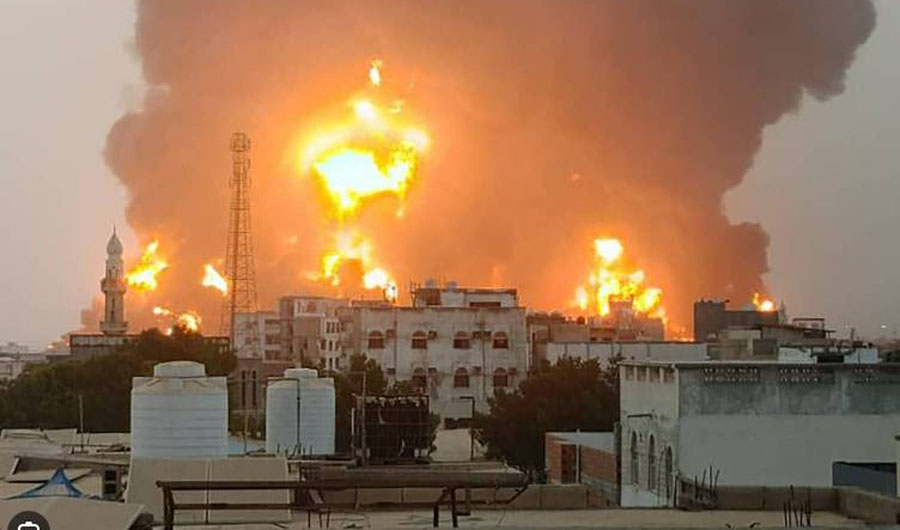
Israel hits ports, energy sites in Yemen after missile intercepted
JERUSALEM: Israel said Thursday it struck ports and energy infrastructure it alleges are used by Houthi militants, after intercepting a missile fired by the group.
Israel’s military said it “conducted precise strikes on Houthi military targets in Yemen — including ports and energy infrastructure in Sanaa, which the Houthis have been using in ways that effectively contributed to their military actions.”
The announcement came shortly after Israel said it had intercepted a missile fired from Yemen.
Al-Masira, a media channel belonging to the Houthis, said a series of “aggressive raids” were launched in the Yemeni capital of Sanaa and the port city of Hodeidah.
It reported raids that “targeted two central power plants” in Yemen’s capital Sanaa, while in Hodeidah it said “the enemy launched four aggressive raids targeting the port… and two raids targeting” an oil facility.
The strikes were the second time this week that Israel’s military has intercepted a missile from Yemen.
On Monday, the Houthis claimed a missile launch they said was aimed at “a military target of the Israeli enemy in the occupied area of Yaffa” — a reference to Israel’s Tel Aviv area.
READ ALSO:
- Gaza mediators intensify ceasefire efforts, Israeli strikes kill 20 people
- PDP expels South-East national vice chairperson over anti-party activities
- Your information on $1bn investment misleading, Dangote Refinery replies NNPCL
Also Monday, an Israeli navy missile boat intercepted a drone in the Mediterranean after it was launched from Yemen, the military said.
The Houthi militants have said they are acting in solidarity with Palestinians and pledged Monday to continue operations “until the aggression on Gaza stops and the siege is lifted.”
On December 9, a drone claimed by Houthis exploded on the top floor of a residential building in the central Israel city of Yavne, causing no casualties.
In July, a Houthi drone attack in Tel Aviv killed an Israeli civilian, prompting retaliatory strikes on the Yemeni port of Hodeidah.
The Houthis have also regularly targeted shipping in the Red Sea and the Gulf of Aden, leading to retaliatory strikes on Houthi targets by United States and sometimes British forces.
Israeli military spokesman Daniel Hagari said the group had become a “global threat,” pointing to Iran’s support for the militants.
“We will continue to act against anyone, anyone in the Middle East, that threatens the state of Israel,” he said.
Israel hits ports, energy sites in Yemen after missile intercepted
International
Gaza mediators intensify ceasefire efforts, Israeli strikes kill 20 people
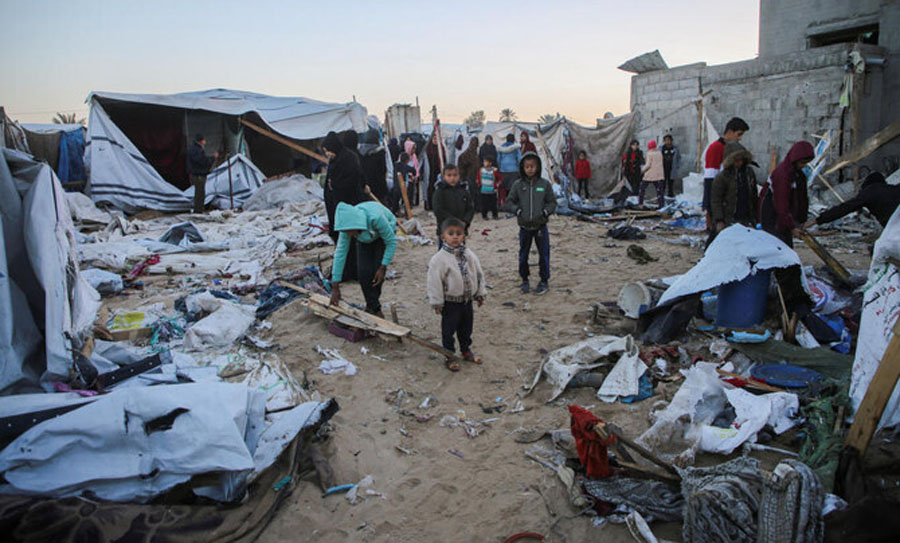
Gaza mediators intensify ceasefire efforts, Israeli strikes kill 20 people
CAIRO: The United States, joined by Arab mediators, sought on Wednesday to conclude an agreement between Israel and Hamas to halt the 14-month-old war in the Gaza Strip where medics said Israeli strikes killed at least 20 Palestinians overnight.
A Palestinian official close to the negotiations said on Wednesday that mediators had narrowed gaps on most of the agreement’s clauses. He said Israel had introduced conditions which Hamas rejected but would not elaborate.
On Tuesday, sources close to the talks in Cairo, the Egyptian capital, said an agreement could be signed in coming days on a ceasefire and a release of hostages held in Gaza in return for Palestinian prisoners held by Israel.
Medics said an Israeli airstrike killed at least 10 people in a house in the northern town of Beit Lahiya while six were killed in separate airstrikes in Gaza City, Nuseirat camp in central areas, and Rafah near the border with Egypt.
In Beit Hanoun in the northern Gaza Strip, medics said four people were killed in an airstrike on a house. There was no immediate comment from the Israeli military spokesman.
Israeli forces have operated in the towns of Beit Hanoun and Beit Lahiya as well as the nearby Jabalia camp since October, in a campaign the military said aimed to prevent Hamas militants from regrouping.
Palestinians accuse Israel of carrying out acts of “ethnic cleansing” to depopulate the northern edge of the enclave to create a buffer zone. Israel denies it.
READ ALSO:
- PDP expels South-East national vice chairperson over anti-party activities
- Your information on $1bn investment misleading, Dangote Refinery replies NNPCL
- Many die at Ibadan children’s Christmas party stampede, organisers arrested
Hamas does not disclose its casualties, and the Palestinian health ministry does not distinguish in its daily death toll between combatants and non-combatants.
On Wednesday, the Israeli military said it struck a number of Hamas militants planning an imminent attack against Israeli forces operating in Jabalia.
Later on Wednesday, Muhammad Saleh, director of Al-Awda Hospital in Jabalia, said Israeli shelling in the vicinity damaged the facility, wounding seven medics and one patient inside the hospital.
The Israeli military had no immediate comment.
In the Central Gaza camp of Bureij, Palestinian families began leaving some districts after the army posted new evacuation orders on X and in written and audio messages to mobile phones of some of the population there, citing new firing of rockets by Palestinian militants from the area.
CEASEFIRE GAINS MOMENTUM
The US administration, joined by mediators from Egypt and Qatar, has made intensive efforts in recent days to advance the talks before President Joe Biden leaves office next month.
In Jerusalem, Israeli President Isaac Herzog met Adam Boehler, US President-elect Donald Trump’s designated envoy for hostage affairs. Trump has threatened that “all hell is going to break out” if Hamas does not release its hostages by Jan. 20, the day Trump returns to the White House.
CIA Director William Burns was due in Doha on Wednesday for talks with Qatari Prime Minister Sheikh Mohammed bin Abdulrahman Al-Thani on bridging remaining gaps between Israel and Hamas, other knowledgeable sources said. The CIA declined to comment.
Israeli negotiators were in Doha on Monday looking to bridge gaps between Israel and Hamas on a deal Biden outlined in May.
There have been repeated rounds of talks over the past year, all of which have failed, with Israel insisting on retaining a military presence in Gaza and Hamas refusing to release hostages until the troops pulled out.
The war in Gaza, triggered by a Hamas-led attack on communities in southern Israel that killed some 1,200 people and saw more than 250 abducted as hostages, has sent shockwaves across the Middle East and left Israel isolated internationally.
Israel’s campaign has killed more than 45,000 Palestinians, displaced most of the 2.3 million population and reduced much of the coastal enclave to ruins.
Gaza mediators intensify ceasefire efforts, Israeli strikes kill 20 people
ARAB NEWS
-

 Railway12 hours ago
Railway12 hours agoLagos Rail Mass Transit part of FG free train ride – NRC
-

 metro2 days ago
metro2 days agoCourt stops customs from seizing imported rice in open market
-

 metro3 days ago
metro3 days agoFG transfers electricity market regulatory oversight in Lagos to LASERC
-

 metro2 days ago
metro2 days agoAfe Babalola: Court grants Dele Farotimi bail, barred from media interviews
-

 metro2 days ago
metro2 days agoIbadan stampede: Tinubu orders probe as death toll hits 40
-

 News2 days ago
News2 days agoAdebayo Ogunlesi, 2 other Nigerians make Forbes 50 wealthiest Black Americans list 2024
-
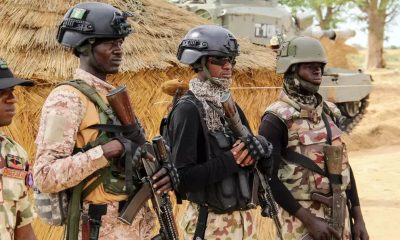
 metro3 days ago
metro3 days agoAbuja demolition: Soldiers attack FCTA officials, seize vehicles
-

 metro2 days ago
metro2 days agoNAFDAC seizes N5bn fake rice, seals factory in Nasarawa

